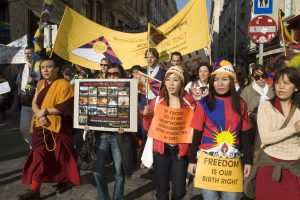In 1982, I walked across the 13,058 ft Rohtang Pass near the Tibetan cultural area of Ladakh and marveled at how there was so much snow that the Indian army had to use dynamite to clear miles of highway. Tibet and its environs are sometimes called the Land of Snows. But eerily, as the Chinese regime manufactured a manmade snow world during this year’s Winter Olympics – at a huge environmental cost – in barren mountains near Beijing, Tibet and the region’s natural snow were completely off-screen.
Sadly, the plight of the Tibetan people was like the real snow thousands of miles offstage: going almost completely unnoticed. Millions of Westerners may read books about Tibetan Buddhism or try out Tibetan meditation techniques; but few are aware of the extent of the Chinese government’s slow cultural genocide of the Tibetan people themselves. As we approach the anniversary of the 1959 Tibetan uprising against Chinese occupation, we must stand up for Tibetan rights and put them center stage in U.S. foreign policy once again.
China has long maintained strict control over Tibet, limiting basic civil and political rights. In the run-up to the 2008 Olympics Games, Chinese authorities made concessions to critics in the international community by promising to allow open internet access. But they still blocked pro-Tibetan independence group websites and intensified security controls on Tibetans.
This year, Chinese authorities didn’t even bother to pretend to loosen restrictions. According to Radio Free Asia, China tightened already harsh travel and security restrictions in Tibet ahead of the games, and completely banned Tibetans from communicating with those in exile. Tibetans have been arrested for simple acts, such as waving their flag or posting pictures of the Dalai Lama, their spiritual leader. In primary schools, Tibetan children are taught in Mandarin as part of the Chinese government’s efforts to dismantle Tibet’s culture and language. Thousands of schools that refused to comply were forced shut last year. A local Tibetan said the situation this year was “more intense than ever before” and that “Tibetans are terrified.”
According to activists, more than 150 Tibetans self-immolated after the 2008 Games because of “so much repression in Tibet.” Recent news of the self-immolation of singer Tsewang Norbu is a tragic reminder that we cannot let history repeat itself this year.
The United States must stand at the forefront of international efforts to stand up for Tibet. After Congressional pressure – which I joined – the Biden administration designated Under Secretary Uzra Zeya, who oversees human rights and democracy issues at the State Department, as special coordinator for Tibetan issues.
It’s critical that the new special coordinator take seriously the role of U.S. support for human rights and fundamental freedoms in Tibet. One of the first things she should do is to travel to Dharamsala, India, as I once did, to hear from the Dalai Lama and Tibetan exiles. She should also work to increase the pressure on Beijing to forge a peaceful resolution to the conflict. More than a decade has passed since the last time Beijing welcomed representatives of the Dalai Lama and the Central Tibetan Administration.
The new special coordinator should also launch a major campaign to establish an international monitoring and reporting mechanism on human rights abuses in China. Its mandate should focus on particularly egregious cases like Tibet, Xinjiang, and Hong Kong, but also on abuses committed against citizens throughout mainland China. A similar investigation completed under the auspices of the U.N. Human Rights Council – a monumental inquiry on North Korea – focused the world’s attention on the systematic rights abuses committed by the government and laid the groundwork for international accountability mechanisms.
The Chinese government would prefer that Beijing and Xi’s manufactured snowscape remain the focus of the international community. But Tibetans are at the front of efforts to raise awareness of the Chinese government’s abuses. Hundreds of Tibetan and Uyghur activists marched on the headquarters of the International Olympic Committee’s headquarters in Switzerland, and demonstrations were planned in Washington, D.C. and around the country for the March 10 anniversary.
Tibetans are willing to show up for their rights; it’s up to us to make clear that we will not allow the Tibet issue to be hidden beneath mountains of artificial snow.
































